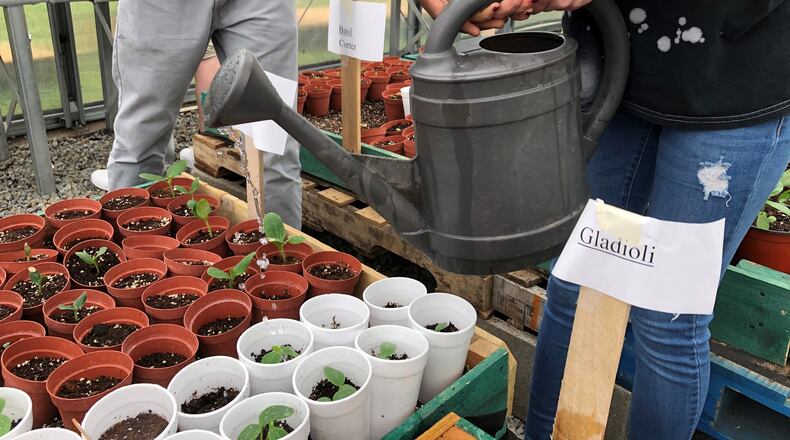The program is part of an effort to create a more humane court system, said Mike Higgins, the director of prevention and intervention services for the court. In 2017, the Greene County Juvenile Court committed to being a “juvenile detention services alternatives initiative” court.
The assessment center opened last April and the intervention center opened in 2017. Both are housed in the former boys’ residential center behind the Greene County Juvenile Court.
Higgins called programs like these “off ramps” for kids, before getting deeper into the system.
Research has found that youth placed into pretrial detention are more likely to be formally charged down the road, Higgins said. Placing a juvenile in detention also increases their likelihood of failing or dropping out of school.
The director of the greenhouse, Emmanuel Birgen, said the juveniles like to watch their plants grow. Birgen came to the U.S. from Kenya to run for Central State University and now works for the Youth Assessment and Intervention Center.
The youth grow everything from tomatoes to peppers to herbs to succulents to pansies in the greenhouse. The vegetables grown are either donated to local restaurant One Bistro or local families. Birgen said the juveniles can take vegetables home too.
The juveniles follow their plants from putting the seeds in the dirt through the harvest process.
Birgen said he gives the youth different chores each day in the greenhouse and tries to tie what they do in the greenhouse with ethics and morals they learn at the intervention and assessment center. Birgen said he also teaches them how humans are connected to plants and the Earth. There are also lessons on decision-making and responsibility to be learned in the greenhouse, Birgen said.
“I try to teach them you reap what you sow,” Birgen said. “It’s the same in life, if you plant seeds and do bad things, you’ll grow bad things.”
Birgen said he teaches the youth to water properly, fertilize, test the soil pH, propagate plants and more. At the greenhouse, they can also learn how to read the temperature on a thermometer and regulate the grow light heat.
“On the first day, they don’t really want to touch the soil or anything,” Birgen said. “But after a few days they can’t wait to get out to the greenhouse and check their plant. They don’t even want gloves, they want to touch the soil.”
Birgen said he lets them choose what to plant.
“A lot of them are growing up with a lot of fast food and many of them don’t know where their food comes from,” Birgen said.
Birgen hopes to take them with him this fall to donate the vegetables to One Bistro.
“We want to give back to the community and we want to show the kids that it feels good to give back and do something nice,” Birgen said.
Birgen also has plans for a plant sale at the end of the month.
The greenhouse is modeled off of a similar program in Warren County, Juvenile Judge Amy Lewis said.
Higgins said over half of the kids they see through the intervention and assessment center are from Xenia and Fairborn. Birgen said he has two groups of three to five juveniles ranging from 12- to 18-years-old in the greenhouse at a time.
The greenhouse was originally funded by a Reclaim grant from the Ohio Department of Youth Services. It is now funded and supported by donations from various community groups, like the Xenia Rotary Club, the Yellow Springs Community Foundation and the 100 Women of Beavercreek club.
About the Author


